
Journal of Investment Management
Scope & Guideline
Unlocking the Secrets of Successful Asset Allocation.
Introduction
Aims and Scopes
- Investment Strategies and Portfolio Management:
The journal explores various investment strategies and portfolio management techniques, focusing on optimizing returns while managing risks in different market conditions. - Asset Pricing Models and Theories:
Research on asset pricing models, including traditional and modern theories, is a core area, helping practitioners understand the valuation of financial instruments. - Behavioral Finance and Market Psychology:
The journal addresses behavioral finance, examining how psychological factors influence investor behavior and market dynamics, which is crucial for developing effective investment strategies. - Risk Management and Derivatives:
A significant focus is on risk management practices, including the use of derivatives and other financial instruments to hedge against market risks. - Sustainable and Responsible Investing:
The journal emphasizes the growing importance of ESG (Environmental, Social, and Governance) factors in investment decision-making, reflecting a shift towards sustainable investing. - Financial Technology and Innovations:
Research on the impact of technology, including AI and machine learning, on investment management practices is increasingly highlighted, showcasing innovative approaches to asset management.
Trending and Emerging
- Artificial Intelligence and Machine Learning in Investing:
Recent publications have increasingly focused on AI and machine learning applications in investment management, highlighting their potential to enhance decision-making and optimize portfolio performance. - Sustainable Investing and ESG Integration:
There is a growing trend towards research on sustainable investing and the integration of ESG factors into investment decisions, reflecting a heightened awareness of environmental and social responsibilities among investors. - Behavioral Economics and Investor Psychology:
Emerging research themes emphasize the role of behavioral economics in understanding investor decisions, particularly how biases and emotions impact market behavior. - Risk Management Innovations:
There is an increasing focus on innovative risk management techniques, particularly those that leverage technology to better assess and mitigate risks in dynamic market environments. - Impact of Macroeconomic Factors on Investment Strategies:
Recent studies have begun to emphasize the influence of macroeconomic variables on investment strategies, suggesting a more holistic approach to investment management that accounts for broader economic trends.
Declining or Waning
- Traditional Active Management:
There has been a noticeable decrease in research focused solely on traditional active management strategies, as the industry increasingly shifts towards passive investing and alternative strategies. - Arbitrage Opportunities in Equities:
Research exploring arbitrage opportunities specifically within equity markets appears to be waning, likely due to market efficiency and the rise of algorithmic trading reducing the prevalence of such opportunities. - Market Timing Strategies:
The effectiveness of market timing strategies has been increasingly questioned, leading to less frequent exploration of this theme in favor of more stable, long-term investment approaches. - Commodity and Forex Trading Strategies:
The focus on detailed analyses of commodity and foreign exchange trading strategies has declined, possibly as investors gravitate towards more integrated approaches that consider broader asset classes. - Theoretical Models Lacking Practical Application:
There is a diminishing trend in publishing purely theoretical models that do not demonstrate clear practical implications, as the journal prioritizes research that offers actionable insights for practitioners.
Similar Journals
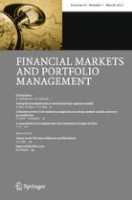
Financial Markets and Portfolio Management
Exploring the Dynamics of Markets and Portfolios.Financial Markets and Portfolio Management is a renowned peer-reviewed journal published by Springer, focusing on the dynamic and evolving intersections of finance, economics, and accounting. With an ISSN of 1934-4554 and an e-ISSN of 2373-8529, the journal provides a platform for innovative research on financial markets, investment strategies, and portfolio management techniques. It boasts an impactful presence in the academic community, with a Scopus ranking placing it in the 58th percentile in Finance and the 51st percentile in Accounting, underscoring its significance in both fields. Spanning coverage from 2006 to 2024, the journal offers essential insights for researchers, practitioners, and students interested in the latest developments and empirical analyses in financial practices. Although it does not offer open access options, its rigorous editorial standards ensure high-quality content accessible to library and institutional resources. The journal plays a pivotal role in advancing knowledge and fostering dialogue in an increasingly complex financial landscape.

FINANCIAL REVIEW
Innovative Insights for Today's Financial ChallengesFINANCIAL REVIEW, a premier journal in the fields of Economics and Finance, is published by Wiley and has been contributing to the body of knowledge since its inception in 1969. With an impressive track record reflected by its Q1 ratings in both Economics and Econometrics as well as Finance, this journal stands out as a crucial resource for researchers, professionals, and students alike. The journal hosts a diverse array of scholarly articles that not only address contemporary financial issues but also provide innovative insights into economic theories and practices. Although it does not offer open access, its high impact factor and strong Scopus rankings—ranking #275 out of 716 in Economics and Econometrics and #125 out of 317 in Finance—underscore its significance in advancing academic discourse and influencing policy in the financial sector. Researchers are encouraged to explore the latest findings and methodologies shared in this esteemed journal, ensuring they remain at the forefront of their fields.
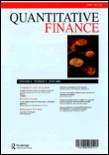
QUANTITATIVE FINANCE
Elevating discourse in finance through cutting-edge research.QUANTITATIVE FINANCE, published by Routledge Journals, Taylor & Francis Ltd, stands at the forefront of academic research in the dynamic fields of finance, economics, and econometrics. With a strong commitment to disseminating cutting-edge research, this esteemed journal, which has been published since 2001 and continues to thrive with an anticipated convergence until 2024, occupies a prestigious Q1 ranking in Economics, Econometrics, and Finance and a Q2 ranking in Finance as of 2023. It serves as an essential platform for interdisciplinary studies, aiming to bridge theoretical approaches and practical applications in quantitative methods. Researchers, professionals, and students are provided access to a wealth of high-quality articles that contribute to the ongoing discourse and advancements in these fields. As the journal continues to impact its community, QUANTITATIVE FINANCE remains an invaluable resource for those seeking to stay at the cutting edge of financial research and its applications globally.
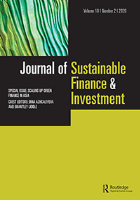
Journal of Sustainable Finance & Investment
Shaping the Future of Finance with Sustainability in MindThe Journal of Sustainable Finance & Investment, published by Routledge Journals, Taylor & Francis Ltd, stands as a premier academic platform dedicated to advancing research in sustainable finance and investment practices. With an ISSN of 2043-0795 and E-ISSN of 2043-0809, this journal has carved out a significant niche in the landscape of interdisciplinary finance studies since its inception in 2011. Located in the United Kingdom, it is distinguished by its impressive quartile ranking of Q1 across prominent categories, including Business and International Management, Economics, Econometrics and Finance, and Finance. The journal boasts an exceptional Scopus rank, sitting in the top-tier percentile in multiple fields, underscoring its rigorous academic standards and the impact of its published research. Aimed at researchers, professionals, and students passionate about finance's role in promoting sustainability, the journal prioritizes innovative studies that interface financial systems with social and environmental imperatives. Although it currently does not offer Open Access, it remains a crucial resource for accessing cutting-edge insights and shaping sustainable investment practices globally.

International Review of Finance
Innovating discourse in the realm of finance research.International Review of Finance is a prestigious academic journal published by Wiley, located in the United Kingdom. With its ISSN 1369-412X and E-ISSN 1468-2443, this journal serves as an essential platform for researchers and practitioners in the fields of Economics and Finance. Ranked in the Q2 quartile for both Economics and Econometrics and Finance as of 2023, it showcases high-quality research that contributes significantly to theoretical and practical advancements. Reflecting its standing, the journal is positioned in the 61st percentile in Economics and Econometrics and the 60th percentile in Finance according to Scopus rankings. The scope of the journal includes a diverse range of topics, encouraging innovative discourse across various financial disciplines. Although it does not offer open access, the International Review of Finance continues to be an important resource for academics, professionals, and students seeking to deepen their understanding of evolving financial theories and practices.
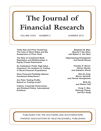
JOURNAL OF FINANCIAL RESEARCH
Illuminating Contemporary Challenges in FinanceThe JOURNAL OF FINANCIAL RESEARCH, published by WILEY, stands as a pivotal platform for disseminating innovative research in the fields of finance and accounting since its inception in 1978. With an ISSN of 0270-2592 and an E-ISSN of 1475-6803, this journal aims to address contemporary challenges and trends within the financial research landscape. It has achieved notable recognition, being placed in the Q2 category for both Finance and Accounting in the 2023 rankings, signifying its relevance and impact within the academic community. Although it does not currently offer open access, the journal is accessible through various academic databases, catering to a diverse audience of researchers, professionals, and students keen on advancing their knowledge and understanding of financial systems and methodologies. With an evolving scope that encompasses empirical studies, theoretical frameworks, and practical applications, the JOURNAL OF FINANCIAL RESEARCH is committed to contributing valuable insights into the complexities of financial practices and policies.

Probability Uncertainty and Quantitative Risk
Empowering Research in Applied Mathematics and StatisticsProbability Uncertainty and Quantitative Risk, published by the American Institute of Mathematical Sciences (AIMS), is a distinguished open-access journal that has been contributing to the academic community since its inception in 2016. With a focus on the crucial interplay between probability, uncertainty, and quantitative risk assessment, this journal serves as a vital platform for researchers, practitioners, and students engaged in the fields of Applied Mathematics and Statistics. The journal's ranking in the Q2 category for both Applied Mathematics and Statistics and Probability reflects its growing influence and relevance, while its diverse scope encourages interdisciplinary studies. As a part of the Scopus database and maintaining a consistent publication pace through 2024, Probability Uncertainty and Quantitative Risk is essential for anyone looking to remain at the forefront of research in risk analysis and uncertainty modeling. Its commitment to open access since 2016 further enhances accessibility to cutting-edge findings, making it an indispensable resource for academics and industry professionals alike.

Journal of Investing
Exploring innovative practices in finance and technology.Welcome to the Journal of Investing, a critical platform dedicated to advancing knowledge in the fields of finance, strategy, and management of technology and innovation. Published by PAGEANT MEDIA LTD, this esteemed journal, with ISSN 1068-0896 and E-ISSN 2168-8613, provides a scholarly forum for researchers, practitioners, and educators to explore contemporary issues and innovative practices within the investment landscape. With a notable Q3 ranking in Finance, Management of Technology and Innovation, and Strategy and Management, the journal asserts itself as a pivotal resource, contributing to the academic dialogue in these crucial disciplines. Though it operates under a traditional access model, the journal is committed to publishing high-quality research that influences both theoretical and practical dimensions of investing. Join us in exploring vital insights that drive the investment community forward, fostering informed decision-making and strategic development.
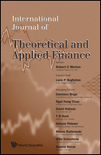
International Journal of Theoretical and Applied Finance
Empowering researchers with a platform for financial excellence.International Journal of Theoretical and Applied Finance is a distinguished publication in the field of finance, serving as a critical platform for the dissemination of innovative research and theoretical insights since its inception in 2003. Published by World Scientific Publishing Co Pte Ltd in Singapore, this journal boasts an impressive Q2 ranking in the realms of Economics, Econometrics, and Finance (miscellaneous) and a solid Q3 status in Finance for 2023. With a commitment to advancing knowledge in the complex world of theoretical frameworks and applied financial practices, it welcomes original research articles, comprehensive reviews, and case studies that explore varied facets of finance. Researchers, professionals, and students benefit from the journal's rigorous peer-review process and an ever-expanding repository of knowledge, making it an indispensable resource in the financial academic community. The journal does not currently offer open access, reflecting its selective approach to publishing high-quality content aimed at a specialized audience.
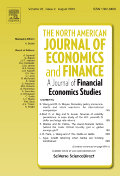
North American Journal of Economics and Finance
Advancing the frontiers of economic thought.The North American Journal of Economics and Finance is a premier academic journal published by Elsevier Science Inc. since 1992, dedicated to advancing the field of economics and finance through rigorous research and scholarship. With an impressive impact factor and recognition in the Q2 category for Economics and Econometrics and Q1 for Finance as of 2023, this journal holds a significant position in the academic community, ranked #41 out of 317 in Finance and #100 out of 716 in Economics. The journal features high-quality, peer-reviewed articles that cover a broad range of topics, from theoretical frameworks to empirical analyses and practical applications. Though not an open-access platform, the journal provides valuable insights for researchers, practitioners, and students alike, promoting knowledge dissemination in the dynamic landscape of economic and financial studies. With its commitment to excellence, the North American Journal of Economics and Finance serves as an essential resource for those seeking to deepen their understanding of contemporary issues in these critical fields.